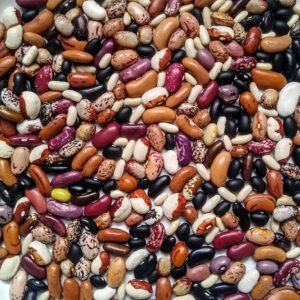
Cross-posted from EcoNews Aug/Sept 2011
Seed saving has been part of human culture since the beginning of agriculture. When our ancestors began saving seed from wild plants, we began a co-evolutionary relationship with plants that is central to our culture. But today, however, seed industry consolidation and the loss of seed knowledge threaten to sever our relationship to seeds, the fundamental basis of our global food supply.
Seed Monopolies
In the last 40 years, seed companies have rapidly consolidated as they have become absorbed by transnational firms with chemical and biotechnology interests. This concentration of market power is a consequence of weak antitrust law enforcement and Supreme Court decisions which have allowed plant products to be patented, resulting in concentrated ownership of plant genetic resources. These two factors have resulted in less choice in the marketplace and a lack of genetic diversity in available seed. At least 200 independent seed companies have been acquired or gone out of business in the last thirteen years, including companies interested in providing for the organic and non-GMO seed market.
Some of the worst concentration exists in major field crops. Three firms, Monsanto, Pioneer/DuPont, and Syngenta, account for 75 percent of corn seed sales nationwide. The development and control of genetically engineered traits, namely RoundUp Ready® and Bt, has facilitated concentration in the seed industry and patented ownership of seed genetics. Nearly all conventional U.S. corn, soybean, and cotton acreage is planted with genetically engineered varieties that include genes patented by Monsanto.
Genetic engineering threatens us in other ways as well. As a result of the wide adoption of herbicide-tolerant crops — more than 60% of GE crops planted worldwide are engineered to tolerate herbicides — farmers have applied 318 million more pounds of pesticides over the last 13 years. GE crops have also led to incredible weed resistance that many agricultural specialists now deem the largest threat to production agriculture. The threat of GMO contamination to organic and other non-GE seed and crops also risks compromising livelihoods, genetic integrity, and faith in the organic label.
Seed Amnesia
In addition to the loss in crop variety diversity brought about by industry concentration, there has been a concurrent loss in the base of knowledge and skills necessary to steward and improve seeds in an ecologically and ethically sound manner.
If you talk with most people who lived or worked on a farm prior to 1950, they might describe for you the area of their house devoted to seed storage and organization. They might also describe their process for selecting the best seed from the best plants. They understood that plant varieties were not static, but instead were changeable and needed constant care to maintain them.
These farmers and gardeners, once the primary seed stewards around the globe, now rarely participate in plant breeding or conservation. University and private sector seed specialists have replaced farmers and gardeners as the managers of the world’s crop genetics, and only a handful of these specialists work to address the specific needs of sustainable and organic farmers.
Efforts to confront seed monopolies must be coupled with efforts to create an environment in which innovators such as the farmers, private breeders, and public breeders interested in organic and sustainable seed systems have an opportunity to thrive.
Organic Seed Alliance
One organization working toward these ends is Organic Seed Alliance (OSA). OSA works to ensure that farmers and gardeners have the knowledge and right to control the seed they use through education, research, technical assistance, and advocacy programs. We partner with and teach farmers to develop healthy seed systems as an essential component of sustainable organic agriculture and vibrant regional foodsheds, including the use and development of seed that produces best in their locale, and seed saving for on-farm use and commercial production. We also partner with other organizations to advocate preservation of genetic seed diversity and prevent production of GMO crops in the US.
What you can do:
The first step is to realize the importance of seeds. When you open your seed catalogs in the winter, ask yourself: Where does this seed come from? Is it organic? Are your seed purchases supporting small independent seed companies, or contributing to industry consolidation? When you shop at the farmer’s market, ask your farmers the same questions. Many farmers in Humboldt County produce at least some of their own seed, including Jacque and Amy Neukom at Neukom Family Farms and Paul Giuntoli of Warren Creek Farm.
The second step is to increase your own seed knowledge. OSA regularly teaches seed saving classes in Humboldt County. Sign up for OSA’s newsletter at www.seedalliance.org or contact Jared Zystro, OSA’s California Research and Education Specialist, at jared@seedalliance.org to find out when the next classes will be offered. Organic Seed Alliance’s website also offers a banquet of free publications on seed saving. Download some of them and lose your seed amnesia.
Finally, it takes a dedicated community to actively resist the push of the giants of the seed industry. You can help maintain a good seed system, so that we can pass on the seeds that our children will plant.
